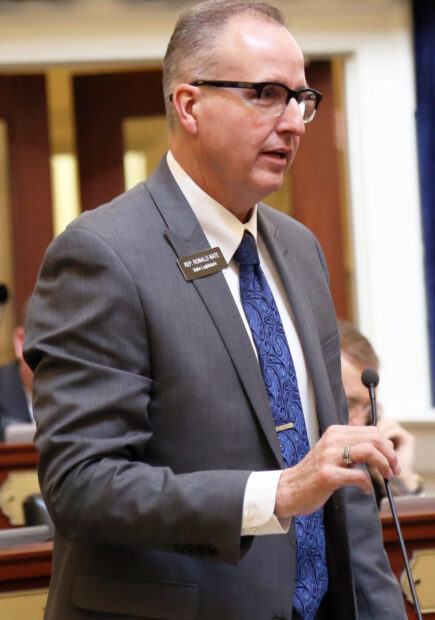Legislative budget-writers put the brakes on replacing the state’s reading test — for now.
The Joint Finance-Appropriations Committee cut $100,000 earmarked to replace the Idaho Reading Indicator, which is used to assess kindergarten through third-grade reading skills.
That might not be the last word. Key legislators are working on a bill to address the reading test, and that might come by the end of the legislative session, said Sen. Dean Mortimer, a JFAC member who also chairs the Senate Education Committee.
“The education community is struggling to get their arms around this issue,” Mortimer, R-Idaho Falls, said before Monday’s JFAC vote.
The state has used the IRI, in some form or another, for nearly 20 years. Educators have long pointed to the IRI’s shortcomings: The test doesn’t diagnose the cause of reading problems, and it focuses on reading speed, not comprehension. So as the state continues a multimillion-dollar campaign to improve early reading skills, the State Department of Education wants to retire what is now known as the “legacy” IRI.
Last fall, 58 schools began piloting a test to replace the IRI — and state officials and some local educators have said the new test provides teachers with better and more complete data. The SDE wants to launch the new test statewide in 2018-19.
But Rep. Wendy Horman says that plan may be premature. And Horman says state superintendent Sherri Ybarra’s request to continue funding a replacement test is “based on a hope.”
Part of this is a function of timing. State agency heads are expected to submit their budget requests by Sept. 1 — so that meant Ybarra had to make a request before pilot schools could even administer a fall reading test. Now, Horman wants to know how students fare on the spring version of the test, and she wants to know how the new test will affect local control.
JFAC could still wind up revisiting the issue — and putting money into replacing the IRI. But with the committee’s 18-0 vote, the budget-writers passed along a spending plan that leaves the funding in limbo, and gives Ybarra a clear directive: “No moneys shall be distributed or expended for a contract to redesign or replace the legacy Idaho Reading Indicator at this time.”
After Monday’s vote, Ybarra expects the issue to be resolved by the end of the session, but she’s not sure what that means for her plans to replace the IRI.
“They’ve got an idea moving forward,” she said. “I’m not worried about it.”
Gun safety in schools bill passes committee
The House Education Committee made history Monday by accepting testimony from outside the Statehouse for the first time — allowing residents from across the state to weigh in remotely, before legislators passed a bill encouraging schools to offer gun safety courses.

Pushed by Rep. Ron Nate, R-Rexburg, House Bill 443 states, in part: “The board of trustees of a school district is encouraged to establish and maintain a firearms safety education course for primary and secondary school students.”
Trustees would be allowed to adopt an elective course developed by the Idaho Department of Fish and Game, a law enforcement agency or an advocacy group such as the National Rifle Association.
Supporters said the bill could save lives and reduce accidental shootings by teaching children how to act responsibly around guns.
“The focus is on what kids should do when they encounter a gun,” Nate said. “Many kids who have not grown up around guns have a natural curiosity about them.”
Opponents said the bill is unnecessary under Idaho law and will cost schools time and money to implement. They also said it would have been more appropriate to pursue a nonbinding resolution, not a full-blown law change.
“Any time we offer courses in our school system, where we bring someone in to teach it, and if we put it during the school day, we do have to make a commitment to 60 hours (of instruction time) in a high school setting,” said Rep. Sally Toone, D-Gooding, a retired teacher. “Who is going to pay for that instructor?”
A note attached to Nate’s bill said passing HB 443 won’t cost the state general fund money because the courses would be optional.
Nate also said districts don’t have to adopt a full 60-hour elective course, and could instead choose to offer firearms safety courses as an assembly or part of larger, existing course, such as physical education.
Public testimony was evenly split, with two people supporting and two opposing.
House Education’s vote was split along party lines, with all Republicans supporting it and all three Democrats opposing it. HB 443 heads to the House floor with a recommendation it passes.
A repeat elections bill repeat
Rep. Heather Scott is running another version of her bill to crack down on “repeat” ballot measures.
It’s a scaled-back version, according to Betsy Russell of the Spokane Spokesman-Review. The new bill would require school districts and local governments to wait a year to try a second bond issue after voters rejected a proposal.
In her first run at the issue, the Blanchard Republican looked to limit both bond issues and tax levies. But after House colleagues voted down Scott’s attempt to amend her own bill, she pulled the bill off the House floor.
The House State Affairs Committee introduced Scott’s latest bill Monday morning.
Election advocacy bill advances
The Idaho House voted Monday to pass the Public Integrity in Elections Act, which prohibits government agencies or school districts from using public money or resources for advocacy.

Pushed by Rep. Jason Monks, R-Nampa, House Bill 620 states, in part: “The Legislature finds that it is against the public policy of the state of Idaho for public funds, resources or property to be used to advocate for or against a candidate or ballot measure.”
“It’s all about whether or not they use public funds or resources in advocacy,” Monks said. “They can educate, but cannot advocate.”
Rep. Ilana Rubel, D-Boise, expressed concerns the bill would prohibit students from participating in political clubs or groups at their schools, such as a young Republicans club or a young Democrats club. Monks said the bill applies to districts, governing bodies and public employees and would not prevent students from organizing political groups or exercising their First Amendment rights. Monks said the only issue that could arise would be if a school, district or board advocated for a political group.
Monks pushed a similar measure last year, House Bill 270, which passed the House but never made it out of committee in the Senate.
Monks said he worked with the Idaho School Boards Association to improve upon that proposal and draft the new bill this year. Monks also said the Idaho Association of School Administrators has not taken a position on the legislation.
In the end, the bill passed 58-9. It heads next to the Senate, where it will likely be assigned to the Senate State Affairs Committee.
Career ladder expansion
House Education passed a bill Monday to add school occupational and physical therapists to the Legislature’s career ladder salary law.
Pushed by the State Department of Education, House Bill 503 would allow the SDE to place such therapists on the career ladder in accordance with their years of service.
Passed in 2015, the career ladder is the Legislature’s $250 million, five-year plan to boost salaries for teachers and educators. As things stand, physical and occupational therapists are not part of the career ladder. If the bill passes, school districts will likely see a small increase in state funding for salaries as therapists advance through the different rungs of the career ladder.
The bill passed comfortably with no real debate, and heads next to the House floor with a recommendation it pass.
Idaho Education News reporter Clark Corbin contributed to this report.
